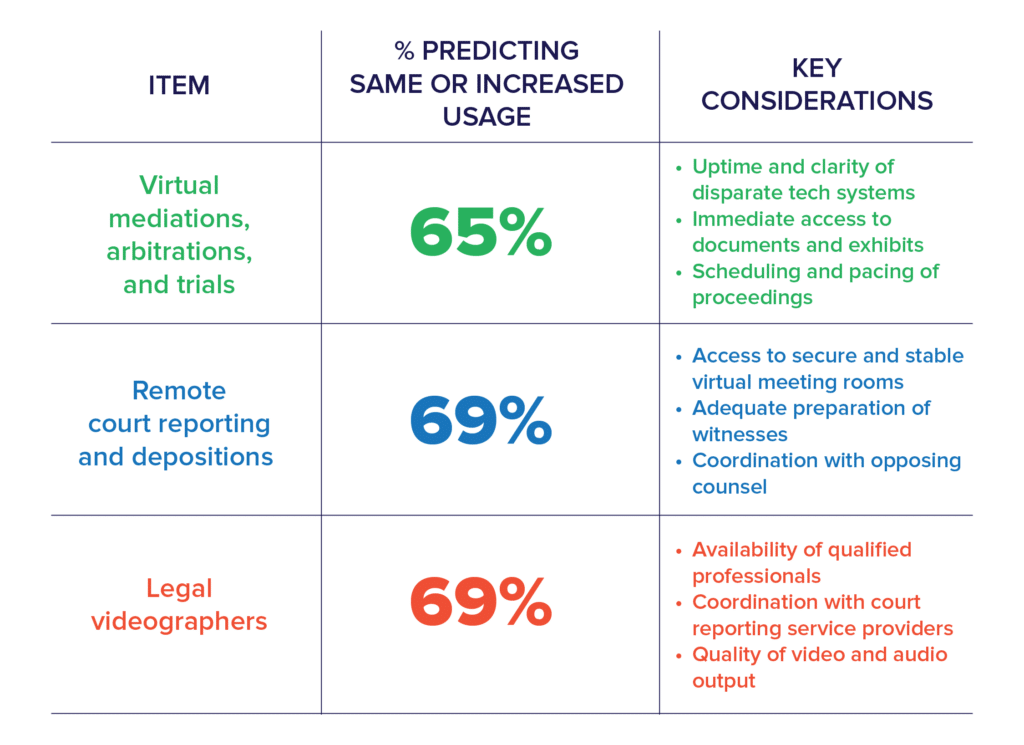Is your Law Firm Ready for Continued Virtual Legal Proceedings?

For 2023, one trend is obvious: legal professionals prefer remote work. According to an ABA report on the future of the profession, 87% of lawyers say their workplaces allow them to work remotely. And in just a few years, the percentage of attorneys working exclusively in the office has dropped to less than 30%.
Add to these figures an increase in litigation volume and virtual legal proceedings in 2023. Is your organization fully prepared for the continuation of remote litigation and remote work in a post-pandemic justice system? U.S. Legal Support set out to ascertain how lawyers were feeling about these industry changes in our first annual Litigation Support Trends Survey, which we conducted in August of 2022.
There were four core themes to our survey data, and we’ve been covering each one in depth over the last few weeks.
- Legal technology trends
- How to vet litigation support providers
- The continued prevalence of remote work in the legal industry
- Increased cybersecurity awareness
Bloomberg Law posits that virtual courts are not going away. Findings from our own research suggest the same. If you haven’t already, it may be time to consider the benefits and barriers to virtual legal proceedings for your firm.
Acceleration of remote legal proceedings
In U.S. Legal Support’s 2022 litigation support trends survey, 27% of respondents expect the use of virtual mediations, arbitrations, and trials to increase in 2023 —three times the 9% who predicted a decrease.
→ For more survey results, download the litigation support trends infographic.
Adoption of remote proceedings initially found purchase in civil matters, extending from motion hearings and status conferences to jury trials. While not every type of case is appropriate for a virtual interface, in some instances, they do make sense on opposite ends of the spectrum.
The virtues of virtual
As we explore in our white paper on hybrid and virtual legal proceedings, the benefits of virtual proceedings extend to participants across the legal profession. They include:
- More timely and cost-effective: incurs fewer travel expenses for witnesses and attorneys
- Easier to schedule: accommodates remote locations and tight timelines
- Less taxing on witnesses: reduces stress from in-person scrutiny in an unfamiliar setting
- More flexible: allows for easier scheduling and coordination across cases and jurisdictions
Case in point: virtual court reporting
Our 2022 litigation support trends survey found that remote proceedings are on the rise:
- 70% of depositions are handled remotely today with 30% in person
- 29% of legal professionals expect the use of remote court reporting/depositions to increase in 2023
Remote depositions and proceedings are the new normal, and they are also the new preference, especially among many court reporting professionals. Remote proceedings give court reporters more power to choose how and when they work, aligning with risings preferences to work virtually because it is more financially viable. Without the need to commute, court reporters can schedule multiple remote jobs a day.
“A majority of court reporters find that remote work is more economically beneficial in comparison to in-person proceedings,” says U.S. Legal Support Director of Reporter Engagement, Sara Giammanco. Giammanco adds, “Remote depositions represent a win-win for all parties involved; stenographers get the flexibility they want while attorneys get the quality they need without coordinating an in-person proceeding.”
→ Read more on how to prepare for virtual proceedings in U.S. Legal Support’s guide to remote deposition basics.
Tech implications for virtual legal services
With the shift to remote comes a need to modernize infrastructure and support networks. Virtual legal services and proceedings are most effective when a secure, stable technical framework exists.
Although 57% of U.S. Legal Support survey participants agree their organization is technologically innovative, gaps persist. One survey respondent lamented, “Our industry is falling behind in terms of technology. The pandemic forced us to adapt but there is still more work to be done. Many lawyers do not have adequate laptops, tablets, mics, and/or webcams for remote work.”
Chart: Preparing for virtual
The chart below links increased usage of remote proceedings (as uncovered in our survey) with specific cultural and technical considerations for your law firm. As usage increases, it is important to weigh key considerations for technological infrastructure to ensure legal proceedings can continue without disruption.

When you’re ready to go remote to a greater degree, it helps to have a litigation support services partner who has been operating remotely even before the earliest days of the pandemic. U.S. Legal Support is happy to share best practices to make your adoption smoother and more successful. For more information on our services, reach out today.
Editoral Policy
Content published on the U.S. Legal Support blog is reviewed by professionals in the legal and litigation support services field to help ensure accurate information. The information provided in this blog is for informational purposes only and should not be construed as legal advice for attorneys or clients.

